John Woodworth, the first Surgeon General of the United States, then called the Supervising Surgeon, was appointed by US President Ulysses S. Grant and confirmed in 1871. The Surgeon General “is the Nation’s Doctor, providing Americans with the best scientific information available on how to improve their health and reduce the risk of illness and injury. The Surgeon General oversees the U.S. Public Health Service (USPHS) Commissioned Corps, an elite group of over 6,000 uniformed officers who are public health professionals. The USPHS mission is to protect, promote, and advance the health of our nation.”
Surgeons General are appointed by the US President and confirmed by the US Senate. Below are the opinions of ten Surgeons General from President Nixon through President Biden.
Acting Surgeons General (who do not require a Senate confirmation) have been assigned the position when an official Surgeon General resigned or the Senate stalled confirmation of a Surgeon General candidate. Only the opinions of official Surgeons General who were confirmed by the Senate are included below, though the dates, names, and appointing president of Acting Surgeons General are noted to explain gaps in the timeline.
Vivek Murthy

Not Clearly Pro or Con
Mar. 25, 2021 – present
Appointed by President Joe Biden
“I do think that, in terms of our approach to marijuana, I worry when we don’t let science guide our process in policy-making. And we know the science tells us that there are some benefits to marijuana from a medical perspective but there are also some harms that we have to consider—and we have to put those together as we think about the right policy.”
Source: Maureen Meehan, “U.S. Surgeon General Vivek Murthy: There Is ‘No Value’ To Incarcerating People For Cannabis Use,” yahoo.com, July 19, 2021
Jan. 20, 2021 – Mar. 24. 2021: Acting Surgeon General Susan Orsega, appointed by President Joe Biden
Jerome Adams
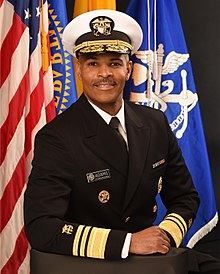
Not Clearly Pro or Con
Sep. 5, 2017 – Jan. 20, 2021
Appointed by President Donald Trump
“Under medical marijuana, I believe it should be like any other drug. We need to let the FDA vet it, study it, vet it. The FDA has actually approved cannabidiol oil and some derivatives of marijuana, Marijuana is not one substance. It’s actually over 100 different substances, some of which benefit, some of which are harmful…
[W]hile I want to make sure we can get the ingredients of medical marijuana appropriately derived so that folks can access treatment, I also have concerns about us encouraging folks to go out and smoke because there’s unintended consequences.I don’t want 10 years down the road where we’re seeing an epidemic of lung cancer among folks who are smoking medical marijuana.”
Source: Scott L. Miley, “U.S. Surgeon General Jerome Adams Supports Studying Medical Marijuana,” newsandtribune.com, Dec. 1, 2017
Apr. 21, 2017 – Sep. 5, 2017: Acting Surgeon General Sylvia Trent-Adams, appointed by President Donald Trump
Vivek Murthy

Not Clearly Pro or Con
Dec. 18, 2014 – Apr. 21, 2017
Appointed by President Barack Obama
“My position is that we have to see what the science tells us about the efficacy of marijuana and I think we’re going to get a lot more data on that. We have some preliminary data showing that for certain medical conditions and symptoms that marijuana can be helpful. So I think we have to use that data to drive policymaking, and I’m very interested to see where that data takes us.”
Source: CBS News, “New Surgeon General Dr. Vivek Murthy: Measles Vaccine Is Safe and Effective,” CBS News, Feb. 4, 2015
July 17, 2013 – Dec. 18, 2014: Acting Surgeon General Boris Lushniak, appointed by President Barack Obama
Regina M. Benjamin
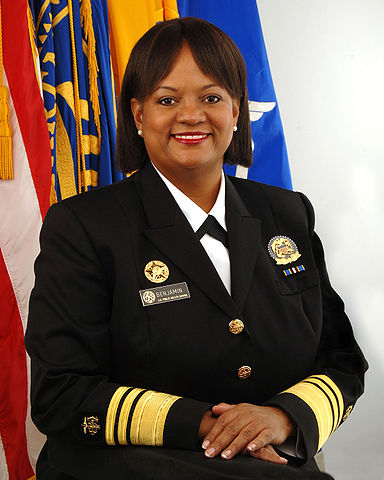
Not Clearly Pro or Con
Nov. 3, 2009 – July 16, 2013
Appointed by President Barack Obama
“There’s evidence that shows that it’s useful for medicine, but we need to investigate how to avoid the adverse effects of smoking marijuana.”
Source: Deborah Solomon, “Doctor’s Orders,” nytimes.com, Jan. 7, 2011
Oct. 1, 2009 – Nov. 3, 2009: Acting Surgeon General Donald L. Weaver, appointed by President Barack Obama
Oct. 1, 2007 – Oct. 1, 2009: Acting Surgeon General Steven K. Galson, appointed by President George W. Bush
Aug. 1, 2006 – Sep. 30, 2007: Acting Surgeon General Kenneth P. Moritsugu, appointed by President George W. Bush
Richard H. Carmona

Not Clearly Pro or Con
Aug. 5, 2002 – July 31, 2006
Appointed by President George W. Bush
“Medical use of marijuana, as a drug, is allowed in many states but still remains federally illegal except for special approved uses… Although there is evidence that some components of marijuana may have medicinal value, the FDA has not put marijuana through the appropriate scientific testing and due diligence to ensure it can be safely and effectively used as a drug and not cause harm to the user.
This is the standard and the law for all new drugs attempting to reach the market in the U.S., but this rigorous approval process has not been applied to marijuana and therefore the public could be at risk.”
Source: Richard Carmona, “Clearing the Air about Marijuana,” medium.com, Nov. 4, 2016
“I cannot recommend to anyone that they smoke, first of all. Smoking is so bad for you. I can’t say it would be safe to eat it, because no one has studied the long- or short-term gastrointestinal effects.”
Source: Deborah Solomon, “Health-Conscious,” nytimes.com, June 19, 2005
Feb. 13, 2002 – Aug. 4, 2002: Acting Surgeon General Kenneth P. Moritsugu, appointed by President George W. Bush
David Satcher
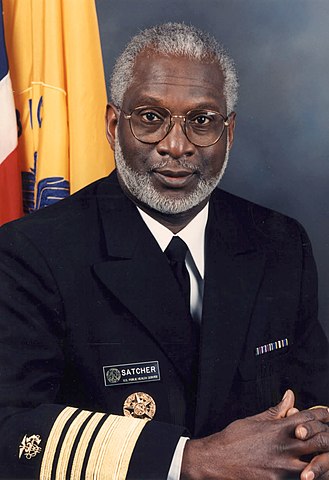
Now Pro / Formerly Con
Feb. 13, 1998 – Feb. 12, 2001
Appointed by President Bill Clinton
“I think obviously physicians make decisions based on their relationship with a patient. Do I believe that medical marijuana should be available in that equation? I do, yes. I’m not convinced that there’s any evidence that marijuana is any more harmful, maybe not as harmful, as alcohol and tobacco. I’m not pushing marijuana, I’m just saying … physicians ought to be able to make decisions about the use of medical marijuana. I’m not advocating for any new drug on the street.”
Source: Patti Singer, “Former Surgeon General on Guns, Drugs, Money for Zika,” democratandchronicle.com, Sep. 12, 2016
“In response to your request dated December 17, 1997, and pursuant to the Controlled Substances Act (CSA)… the Department of Health and Human Services recommends that marijuana continue to be subject to control under Schedule I… As discussed in the attached analysis, marijuana has a high potential for abuse, has no currently accepted medical use in treatment in the United States, and has a lack of accepted safety for use under medical supervision.”
Source: David Satcher, Letter to Donnie R. Marshall (Administrator, DEA), Jan. 17, 2001
Jan. 1, 1995 – July 1, 1997: Acting Surgeon General Audrey F. Manley, appointed by President Bill Clinton
M. Joycelyn Elders
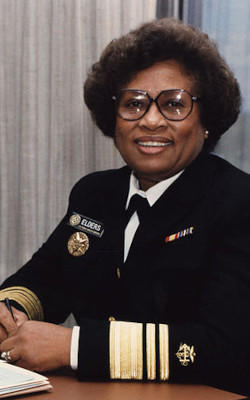
Pro
Sep. 8, 1993 – Dec. 31, 1994
Appointed by President Bill Clinton
“The evidence is overwhelming that marijuana can relieve certain types of pain, nausea, vomiting and other symptoms caused by such illnesses as multiple sclerosis, cancer and AIDS — or by the harsh drugs sometimes used to treat them. And it can do so with remarkable safety. Indeed, marijuana is less toxic than many of the drugs that physicians prescribe every day.”
Source: M. Joycelyn Elders, “Myths about Medical Marijuana,” Providence Journal, Mar. 26, 2004
July 1, 1993 – Sep. 8, 1993: Acting Surgeon General Robert A. Whitney, appointed by President Bill Clinton
Antonia C. Novello
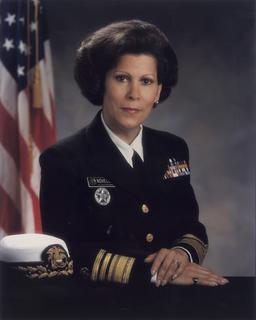
No Position Found
Mar. 9, 1990 – June 30, 1993
Appointed by President George H.W. Bush
Oct. 1, 1989 – Mar. 9, 1990: Acting Surgeon General James O. Mason, appointed by President George H.W. Bush
C. Everett Koop

Con
Jan. 21, 1982 – Oct. 1, 1989
Appointed by President Ronald Reagan
“Based on scientific evidence published to date, it is the opinion of the Department of Health and Human Services that marijuana has a broad range of psychological and biological effects, many of which are dangerous and harmful to health…
Marijuana is not a benign drug. As Surgeon General, I urge other physicians and professionals to advise parents and patients about the harmful effects of using marijuana and to urge discontinuation of its use.”
Source: C. Everett Koop, “Surgeon General’s Advisory on Marijuana” (draft version), profiles.nlm.nih.gov, 1982
May 14, 1981 – Jan. 21, 1982: Acting Surgeon General Edward Brandt Jr., appointed by President Ronald Reagan
Jan. 21, 1982 – May 14, 1981: Acting Surgeon General John C. Greene, appointed by President Ronald Reagan
Julius B. Richmond
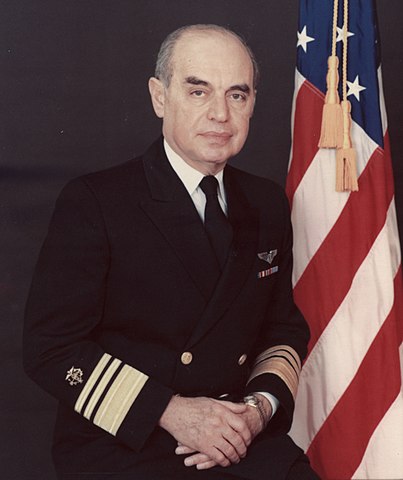
Not Clearly Pro or Con
July 13, 1977 – Jan. 20, 1981
Appointed by President Jimmy Carter
“Surgeon General Julius B. Richmond announced Wednesday the government has approved plans allowing 4,000 cancer specialists to prescribe synthetic marijuana pills to control nausea and vomiting for cancer patients undergoing chemotherapy. The delta-9-tetrahydrocannabinol pills [later formulated into the pharmaceutical drug Marinol (dronabinol)] will be distributed by the National Cancer Institute through hospital pharmacies, and cancer specialists with federal drug clearances will be allowed to write prescriptions for them, Richmond said. The capsules contain a synthetic form of THC, which is found naturally in marijuana. Richmond said the Food and Drug Administration will continue to regard THC as an investigational or experimental drug.”
Source: San Bernardino County Sun, Sep. 11, 1980
Jan. 31, 1973 – July 31, 1977: Acting Surgeon General S. Paul Ehrlich Jr., appointed by President Richard Nixon
Jesse L. Steinfeld
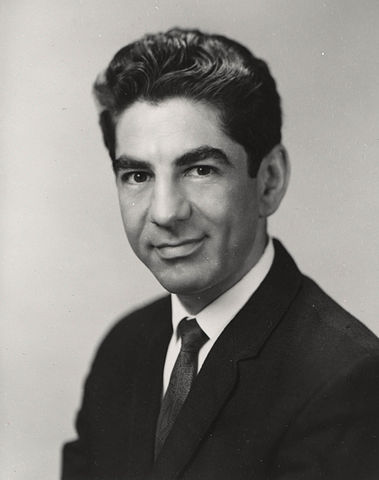
Pro
Dec. 18, 1969 – Jan. 30, 1973
Appointed by President Richard Nixon
“It [marijuana] should be an option for patients who have it recommended by knowledgeable physicians. I don’t recommend it for recreational use.”
Source: Marijuana Policy Project’s (MPP), “Medical Marijuana Endorsements and Statements of Support,” mpp.org (accessed Jan. 27, 2009)
Additional Sources
Office of the Surgeon General, Homepage, hhs.gov (accessed Sep. 22, 2022)


